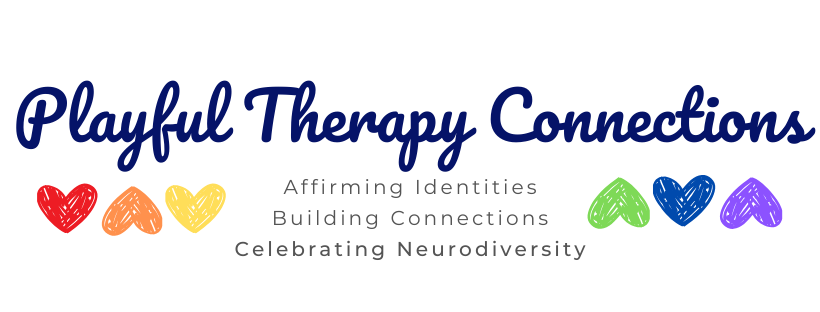Neurodiversity 101: How To Be Neurodiversity-Affirming
Neurodivergent people have many different needs depending on their situations. But the one thing all of them need is an informed, affirming support system. So much of the conversation about Neurodiversity is steeped in the medical model of disability, which we talked about in the last blog post. People focus on treatments and cures, rather than supporting Neurodivergent people so they can discover their strengths and accept themselves. If you want to support your child, here are some ways you can be an affirming advocate for their mental and emotional needs.
Find Their Neurodiversity Superpowers
One of the best ways to be affirming for your child is to recognize the strengths they have *because* of their Neurodivergence, not despite it. Too often we think the challenges that are connected with Neurodivergence are the only important part, when that’s not true.
For example, if your child has a special interest they’re really passionate about, don’t think of it as a weird obsession; learn to recognize its value. It lets your child be an expert on a topic. They get to know more than their peers which can be a huge boost of confidence for someone who likely often feels out of place. They might even get to educate the teacher about one of their interests in class, which lets them see that they can contribute.
Their special interests make them expert researchers and dedicated learners. Other people have to work hard to learn a skill your child naturally possesses, and both of you should feel good about that. This process of discovery can go both ways, too; while you help your child identify their strengths, why not model the behavior for them by discovering a few of your own superpowers.
Neurodivergent kids also frequently have high levels of empathy. They are very sensitive to their environments which can make things challenging when they experience overload, but in the right setting this is a major asset. It helps them connect with people, makes them a good resource for family and friends, and honestly, we should always want more empathetic people in the world.
You will want to take special care that this amazing trait doesn’t get abused or misused by the people around them, but if you are supporting your child in setting boundaries and helping them process what they take in, you’re going to have a very quality human.
Understand Your Child And Their Environment
Being affirming takes work; it involves unlearning most of what you learned about Neurodiversity. We’ve been taught to look at things in a pretty strict binary. Are they healthy or sick, able or not, high or low support? But Neurodiversity doesn’t work like that. It’s a complex web where everything interacts.
This complexity is well-represented in the infographic below designed by Matt Lowry, LPP, an Autistic therapist, which illustrates the Autism spectrum. It’s not a straight line from low to high functioning. These terms don’t work at all. Matt highlights the relationships and interactions between different neurological functions. This helps us understand Neurodivergence as a web, not a line. The graphic only represents autism, but this complexity of interactions is present for many brains.
“The Autism Spectrum” by Matt Lowry, LPP. Image source: https://www.mattlowrylpp.com/meme-gallery
The graphic highlights functions like interoception, (awareness of internal sensations like hunger or tiredness), proprioception (awareness of where our bodies are in space), executive functioning (how we organize, plan, and prioritize), and many other categories that all make up someone's experience of their world. It shows that someone might really struggle with interoception but have great executive functioning skills. And where their strengths lie will dictate how much, and what kind of support they need.
Understanding Matt’s graphic also helps understand how someone’s environment could have such an impact on their needs. Everything is connected, and different functions can be working better in any given place or time. Your child might be skilled at communicating, but in a different way that works for them at home, but in a school setting they may not be able to use that strength if it’s a challenging environment.
If your child has a place where they can use their skills in a safe space, they will be much happier and better adjusted. If, for example, you hear that certain behaviors are just not present at school, you could explore reasons why your child might not consider school a safe place to communicate authentically, and then advocate along with them to change that environment.
To advocate and affirm your child’s neurodivergence, use this graphic and others like it to remember that you’re not just dealing with a flat set of symptoms; you are dealing with a complex network inside a human, which will function best when people take the time to understand and accommodate the support they need.
Listen To Your Child
When Neurodivergence is part of our lives there’s no end of people talking at us. We have doctors, specialists, administrators, and many others. But your priority should be listening to Neurodivergent people, because only they can tell you what they’re experiencing. Listen to your child and really process what they say. Do your own research and read information from Neurodivergent sources. Value lived experience and give Neurodivergent voices top priority.
Communication challenges can make it harder to understand the neurodivergent brain, but this makes it even more important that we take what neurodivergent people say as the authority on the subject. Researchers can find data, but since those researchers’ brains often literally function differently than their subjects, they won’t be able to catch everything important, and if they subscribe to the medical model they may provide ableist and inaccurate information that could be harmful to your child.
Being affirming takes work, but it’s worth it. In the end, we want to help our kids grow into healthy adults who don’t have to spend their whole lives masking. They shouldn’t have to spend years healing from the trauma they collected by living as a Neurodivergent person in a neurotypical world. Some struggles are inevitable, but by actively listening and affirming your child’s identity, you can help them find the confidence and independence they need to live as their true selves.
If you want to connect your child with an affirming therapist who understands Neurodivergence and who is committed to providing support, reach out to us at Playful Therapy Connections to schedule an appointment.


